Human Rights
Tesla criticized for opening showroom in Xinjiang
Human rights activists urge Elon Musk to close the showroom
January 4, 2022 9:52am
Updated: January 5, 2022 2:47pm
Tesla announced it is opening a showroom in Xinjiang, China last Friday, drawing criticism from human rights activists.
Tesla said it will open a showroom in Urumqi, the region’s capital, according to the company's Weibo account. "Let's start Xinjiang's all-electric journey!" the post said.
Xinjiang has been a point of conflict between China and Western governments in recent years. Human rights activists claim that more than 1 million Uyghurs and other Muslim minorities are detained in camps there and are coerced into manual labor.
The Council on American-Islamic Relations (CAIR) urged Tesla on Monday to close the showroom and “cease what amounts to economic support for genocide.”
"No American corporation should be doing business in a region that is the focal point of a campaign of genocide targeting a religious and ethnic minority," CAIR's communications director, Ibrahim Hooper, said in a statement.
Senator Marco Rubio also criticized the electric car company’s decision on Twitter, claiming it was “helping the Chinese Communist Party cover up genocide and slave labor in the region.”
Right after President Biden signed Sen. Rubio’s Uyghur Forced Labor Prevention Act into law, @Tesla opened a store in #Xinjiang. Nationless corporations are helping the Chinese Communist Party cover up genocide and slave labor in the region. https://t.co/2yWBTQSLbM
— Senator Rubio Press (@SenRubioPress) January 3, 2022
"I'll be blunt: Any company doing business in Xinjiang is complicit in the cultural genocide taking place there. But Tesla's actions are especially despicable," said the president of the Alliance of American Manufacturing, Scott Paul.
The Chinese Communist Party (CCP) has been forcing foreign companies to take positions in Xinjiang, Tibet, Taiwan, and other political issues. China has boycotted those who criticize the CCP or express concern about the human rights issues in the region.
On Friday, China threatened to boycott Walmart after shoppers complained they couldn’t find goods from Xinjiang in its China stores. Similarly, Intel Corp. also had to apologize for asking suppliers to avoid sourcing goods from Xinjiang. Nike and H&M also faced backlash last year after expressing concern over the use of forced labor in Xinjiang’s cotton production.
In December of last year, the U.S. barred imports from Xinjiang unless businesses prove the goods do not come from forced labor.








